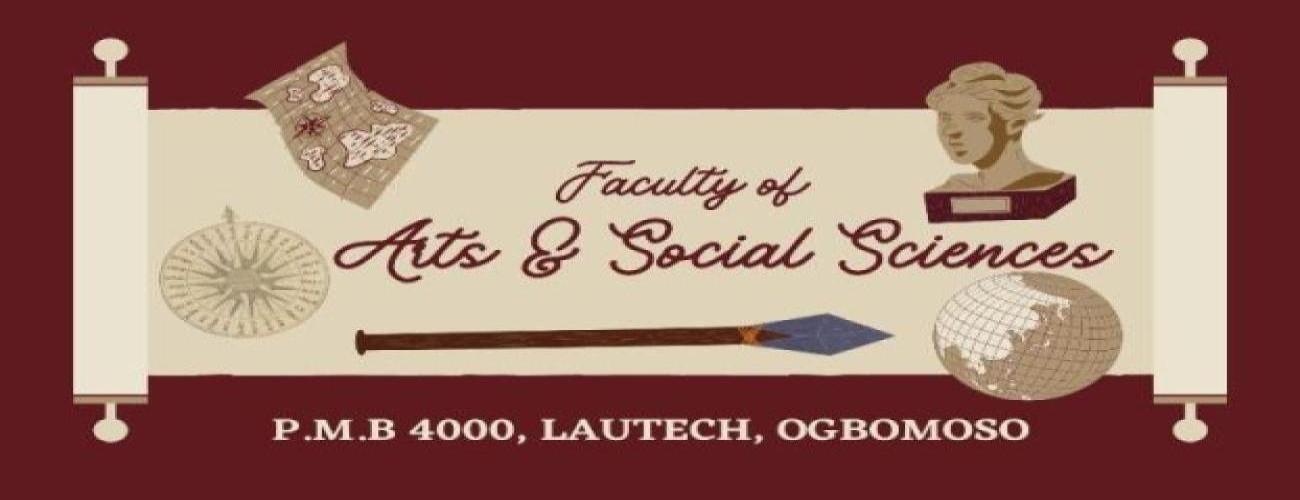About
Faculty of Arts and Social Sciences
The faculty offers a place where scholars with different disciplinary backgrounds - Historians, English and Literary scholars, Sociologists, Philosophers and others - are brought together in joint research. This interdisciplinary approach is predominant in our teaching as well; all of our programmes acquaint students with different disciplines and perspectives.
About Us
The Faculty of Arts and Social Sciences was proposed as one of the faculties in LAUTECH in the Technical Reports establishing the University in April 1990, with the goal of catering for humanities-based disciplines rooted in Arts and Social Sciences, especially to complement scientific knowledge acquisition of the students of the University for an all-inclusive, labour market, suitability.
The fact is that science and technological education cannot exist in a vacuum; it must exist within a social and cultural milieu. Such form of knowledge must, therefore, be imbued and corroborated with the expertise, ability and capability of technical know-how of humanities, especially given that humanities are the bed-rock on which science and technology stand and build upon. This presupposes that knowledge is not only about technological innovation; it is also about being able to make informed choices about priorities and the impact of technology on human lives. Hence, the need to complement the science and technology-based trainings of our university students with good foundation in the humanities had been recognised in the document establishing this university. That necessitated the inclusion of the Department of General Studies, which has been in existence to provide academic services to the science-based disciplines in the University in the humanities disciplines of English, History, Philosophy and Sociology. So, unbundling these disciplines to start the Faculty of Arts and Social Sciences towards producing graduates in the disciplines is aptly desirable at this phase of the development of our dear university, especially to complement the science and technology-based training affordances of the university.
Essentially, studies in the arts and social sciences disciplines will lead students to a deeper as well as critical understanding and interpretation of the individuals, their freedom and their intra- and inter-relationships with the world around them. The fact is that humanities research (within the arts and social sciences backgrounds) is beneficial to learners and academic professionals in a university of technology and to the host community as it has the potential to complement the science-based one towards making the university a centre for systematic boundary-breaking thinking about academic research for humanity in a human-sensitive context. The programmes would therefore play significant roles in the: enhancement of the intellectual atmosphere in which humanities research, teaching, and discussion are conducted; contribution of Oyo-owned institution to the building of connections and collaboration among arts and social sciences researchers in Nigeria; promotion of cross-fertilisation of intellectual ideas among scholars across humanistic disciplines globally; promotion of critical thinking skills crucial for entrenching face-sensitive and ethical behaviours in learners for future leadership positions.
The academic programmes in the Faculty of Arts and Social Sciences targeted at training students for the growth and development of our society, will, therefore, foster provision of arts and social sciences educational trainings to complement the science-based ones and be of immense benefits to the university in different ways. The programmes ultimately have the affordances to reinforce the roles of humanities at the core of universities’ efforts to study and comprehend human endeavours through provision of requisite arts-and social sciences-related skills for human benefits. They thus has the potential of further enhancing the attainment of the university’s vision of being “a centre of academic excellence for the advancement of technology in meeting socio-cultural needs of the society” towards fulfilling the mission of the university, being “to provide suitable condition for the advancement of knowledge through research and learning; produce self-reliant graduates, apply technology-driven knowledge to creativity and positively impact on the global environment and be epitome´ of integrity and service”, especially via science and technology-sensitive arts and social sciences approaches which have become the new normal in tertiary educational institutions globally.

